Grenada, Mississippi
Grenada /ɡrəˈneɪdə/[4] is a city in Grenada County, Mississippi, United States. The population was 13,092 at the 2010 census.[5] It is the county seat of Grenada County.[6]
Grenada, Mississippi | |
|---|---|
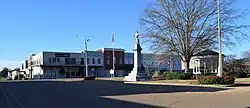 Downtown Grenada | |
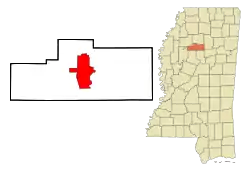 Location of Grenada, Mississippi | |
 Grenada, Mississippi Location in the United States | |
| Coordinates: 33°46′30″N 89°48′32″W | |
| Country | United States |
| State | Mississippi |
| County | Grenada |
| Area | |
| • Total | 30.03 sq mi (77.78 km2) |
| • Land | 30.01 sq mi (77.72 km2) |
| • Water | 0.03 sq mi (0.06 km2) |
| Elevation | 213 ft (65 m) |
| Population | |
| • Total | 13,092 |
| • Estimate (2019)[3] | 12,219 |
| • Density | 407.20/sq mi (157.22/km2) |
| Time zone | UTC−6 (Central (CST)) |
| • Summer (DST) | UTC−5 (CDT) |
| ZIP codes | 38901-38902 |
| Area code(s) | 662 |
| FIPS code | 28-29460 |
| GNIS feature ID | 0670734 |
| Website | www |
History
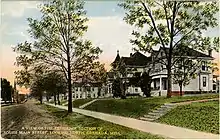
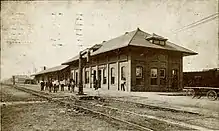
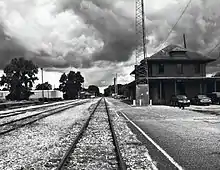
Grenada was formed in 1836, after federal removal of the Choctaw people who had long occupied this territory. It was the result of the union of the two adjacent towns (separated by the present-day Line Street) of Pittsburg and Tulahoma (or Tullahoma), founded, respectively, by Franklin Plummer and Hiram Runnels.[7]
Development included stores and businesses that supported the county court and market days. Plantations were first developed along the Yazoo River for transportation and access to water. Cotton was the major commodity crop, dependent on the labor of enslaved African Americans.
In 1851, Grenada townspeople founded the Yalobusha Baptist Female Institute for education of their young white women. In 1882, the school was taken over by the Methodists and renamed as Grenada College.[7] Classified in the 20th century as a junior college, it encountered financial troubles during the Great Depression. The church closed the college in 1936 and transferred its assets to Millsaps College.[8]
In December 1862, Confederate general Earl Van Dorn, whose troops had been encamped in Grenada, led the three brigades under his command in an attempt to destroy the Union supply depot at Holly Springs, Mississippi.[9]
Lynching of four men
In 1885 two white men, Perry McChristian and Felix Williams, were accused of murdering two white peddlers and were lynched. During the lynching, they implicated two Black men, Bartley James and John Campbell, who were then also lynched by a mob of white men.[10][11][12]
Civil rights era
In the civil rights era, African Americans throughout Mississippi were active in seeking their constitutional rights. Congress passed legislation in 1964 and 1965 that ended segregation of public facilities and protected voting rights, authorizing federal oversight and enforcement. In 1966, James Meredith started a solo March Against Fear to challenge oppression in Mississippi and encourage voter registration by African Americans. His planned route from Memphis, Tennessee to Jackson, Mississippi, passed through Grenada.
After Meredith was shot and wounded on the second day, and had to be hospitalized,[13] other prominent activists and many marchers joined the effort, taking up his cause. The marchers, including Martin Luther King Jr. and Dick Gregory, spent about a week demonstrating in Grenada against discrimination and for voters rights.[14] During that time, the town officials appeared cooperative, protecting the marchers with local police.[15]
Six black voter registrars were hired, and registered 1,000 black residents during that week. But after the march passed through, the county fired the registrars. It was reported later that summer that the town never entered the 1,000 new black voters on official rolls. They had to start all over again to gain official voter registration.[15]
As the civil rights movement continued to press in 1966 and 1967 for voter registration and opportunities in employment, the Southern Christian Leadership Conference (SCLC) ran a civil rights organizing project in Grenada which lasted at least 11 months.[16] They worked to register voters and gain concessions for hiring African Americans in local businesses and restaurants. These were still segregated, despite the Federal anti-segregation and voting rights laws.
Geography
The Yalobusha River flows through Granada. Grenada Lake is located a short distance east of the city.
According to the United States Census Bureau, the city has a total area of 30.0 square miles (78 km2), of which 30.0 square miles (78 km2) is land and 0.03% is water.
Demographics
| Historical population | |||
|---|---|---|---|
| Census | Pop. | %± | |
| 1870 | 1,887 | — | |
| 1880 | 1,914 | 1.4% | |
| 1890 | 2,416 | 26.2% | |
| 1900 | 2,568 | 6.3% | |
| 1910 | 2,814 | 9.6% | |
| 1920 | 3,402 | 20.9% | |
| 1930 | 4,349 | 27.8% | |
| 1940 | 5,831 | 34.1% | |
| 1950 | 7,388 | 26.7% | |
| 1960 | 7,914 | 7.1% | |
| 1970 | 9,944 | 25.7% | |
| 1980 | 11,508 | 15.7% | |
| 1990 | 10,864 | −5.6% | |
| 2000 | 14,879 | 37.0% | |
| 2010 | 13,092 | −12.0% | |
| 2019 (est.) | 12,219 | [3] | −6.7% |
| U.S. Decennial Census[17] | |||
As of the census[18] of 2000, there were 14,879 people, 5,701 households, and 3,870 families residing in the city. The population density was 496.8 people per square mile (191.8/km2). There were 6,210 housing units at an average density of 207.3 per square mile (80.1/km2). The racial makeup of the city was 49.28% White, 49.34% African American, 0.16% Native American, 0.50% Asian, 0.02% Pacific Islander, 0.12% from other races, and 0.56% from two or more races. Hispanic or Latino of any race were 0.70% of the population.
There were 5,701 households, out of which 33.4% had children under the age of 18 living with them, 41.9% were married couples living together, 22.2% had a female householder with no husband present, and 32.1% were non-families. 28.3% of all households were made up of individuals, and 12.1% had someone living alone who was 65 years of age or older. The average household size was 2.52 and the average family size was 3.10.
In the city, the population was spread out, with 27.5% under the age of 18, 9.4% from 18 to 24, 26.7% from 25 to 44, 20.5% from 45 to 64, and 15.9% who were 65 years of age or older. The median age was 35 years. For every 100 females, there were 82.5 males. For every 100 females age 18 and over, there were 76.5 males.
The median income for a household in the city was $25,589, and the median income for a family was $31,316. Males had a median income of $27,946 versus $21,913 for females. The per capita income for the city was $13,734. About 20.3% of families and 23.6% of the population were below the poverty line, including 30.1% of those under age 18 and 27.3% of those age 65 or over.
Notable people
- Phillip Alford, child actor (To Kill a Mockingbird, Shenandoah), resident businessman
- Chris Avery, professional football player, born in Grenada
- Pete Boone, University of Mississippi athletic director, born in Grenada
- E.L. Boteler, Mississippi politician and businessman, born in Grenada
- Ace Cannon, musician
- Walter Davis, blues musician
- Jake Gibbs, baseball player, All American football player
- George Robert Hightower, educator
- Mississippi John Hurt, blues folk musician, died in Grenada
- M. D. Jennings, football player
- Trent Lott, U.S. senator, born in Grenada
- Jim Miles, baseball player
- Ike Pearson, baseball player
- Freeman Ransom, lawyer, businessman, and civic activist
- Greg Robinson, pro football player, born in Grenada
- Magic Sam, blues musician, born in Grenada
- Joseph D. Sayers, 22nd Governor of Texas
- Magic Slim, blues musician
- Homer Spragins, baseball player
- Trumaine Sykes, pro football player
- Donna Tartt, author
- Edward C. Walthall, United States senator
- Howard Waugh, Canadian football player and humanitarian
- Tyre Phillips, professional football player for the Baltimore Ravens
- Eddie Willis, member of Funk Brothers, born in Grenada
- William Winter, governor of Mississippi (1980-1984), born and grew up in Grenada
- Charlie Worsham, country singer, musician, and songwriter
- Frank Wright, jazz musician
Education
The City of Grenada, as well as Grenada County, is served by the Grenada School District. Kirk Academy, a Christian school, is also in Grenada.
See also
- Billups Neon Crossing Signal, a unique railroad crossing signal erected in Grenada.
References
- "2019 U.S. Gazetteer Files". United States Census Bureau. Retrieved July 26, 2020.
- "2010 City Population and Housing Occupancy Status". U.S. Census Bureau. Retrieved May 14, 2012.
- "Population and Housing Unit Estimates". United States Census Bureau. May 24, 2020. Retrieved May 27, 2020.
- Rick Aschmann (2 May 2018). "North American English Dialects, Based on Pronunciation Patterns". Aschmann.net. Retrieved 25 November 2019.
- "Geographic Identifiers: 2010 Demographic Profile Data (G001): Grenada city, Mississippi". American Factfinder. U.S. Census Bureau. Retrieved December 20, 2016.
- "Find a County". National Association of Counties. Archived from the original on 2011-05-31. Retrieved 2011-06-07.
- Federal Writers' Project. Mississippi: A Guide to the Magnolia State. US History Publishers. p. 383. ISBN 978-1-60354-023-0. Retrieved July 24, 2012.
- J. C. Hathorn. A History of Grenada County. David Jensen. p. 55. Retrieved 24 July 2012.
- David Stephen Heidler; Jeanne T. Heidler; David J. Coles (1 September 2002). Encyclopedia of the American Civil War: A Political, Social, and Military History. W. W. Norton & Company. p. 987. ISBN 978-0-393-04758-5. Retrieved 23 July 2012.
- "Southern Gleanings". Magnolia Gazette. 17 July 1885. Retrieved 20 November 2018.
- Daily Alta California 9 July 1885
- Thompson, Julies E. Lynchings in Mississippi: A History, 1865-1965. p. 25.
- "6 June 1966: Black civil rights activist shot". BBC News – On this day. 1966-06-06. Retrieved 2007-10-02.
- Society of Former Special Agents of the FBI. Turner Publishing Company. 15 June 1998. p. 65. ISBN 978-1-56311-473-1. Retrieved 23 July 2012.
- Robert Analavage (August 1966). "Which way in Grenada". The Southern Patriot., reprinted in Clayborne Carson; et al. (2003). Reporting Civil Rights: American Journalism, 1963-1973. Library of America. pp. 516–9. Retrieved 22 July 2012.
- David Garrow (6 January 2004). Bearing the Cross: Martin Luther King, Jr., and the Southern Christian Leadership Conference. HarperCollins. p. 563. ISBN 978-0-06-056692-0. Retrieved 23 July 2012.
- "Census of Population and Housing". Census.gov. Retrieved June 4, 2015.
- "U.S. Census website". United States Census Bureau. Retrieved 2008-01-31.
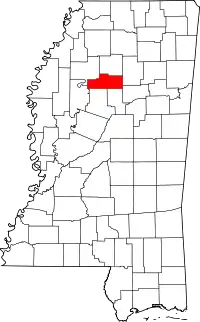
.svg.png.webp)